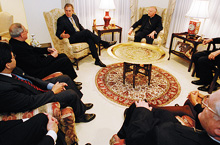|
|
|
|
|
|
|
 |
|
|
President George W. Bush talks with U.S. Catholic leaders at the
residence of the archbishop of Washington Jan. 25 in Hyattsville,
Md. CNS |
|
Catholics study President's social service proposal
By Patricia Zapor
CATHOLIC NEWS SERVICE
The White House and five federal agencies will each have an office
dedicated to helping faith-based and community organizations work
with the government to provide social services under a plan announced
Jan. 29 by President Bush.
John DiIulio, a University of Pennsylvania public policy professor
who helped create and run a program in Boston that is credited
with helping reduce youth homicide in the 1990s, was appointed
to run the White House Office of Faith-Based and Community Initiatives.
“When we see social needs in America, my administration will look
first to faith-based programs and community groups which have
proven their power to save and change lives,” said Bush in announcing
the program at the White House. “We will not fund the religious
activities of any group, but when people of faith provide social
services, we will not discriminate against them.”
As outlined in Bush’s executive order, the White House Office
of Faith-Based and Community Initiatives would establish policies,
priorities and objectives for the federal government to “enlist,
enable, empower and expand the work of faith-based and other community
organizations.”
Its responsibilities would include mobilizing public support for
faith-based initiatives; encouraging private charitable giving
to such efforts; eliminating “unnecessary legislative, regulatory
and other bureaucratic barriers that impede effective faith-based
and other community efforts to solve social problems”; and ensure
those organizations meet “high standards of excellence and accountability.”
A meeting was scheduled Jan. 31 at the White House. Invitees included
Cardinal George, who could not attend, and Catholic Charities
Administrator Father Michael Boland. A further report will appear
in the next issue of The Catholic New World.
The offices would be established in the departments of Justice,
Education, Labor, Health and Human Services and Housing and Urban
Development. HUD has actually had a Center for Community and Interfaith
Partnerships since 1997. Until he was required to resign his political
appointment with the arrival of the new administration earlier
in January, it was headed by Jesuit Father Joe Hacala.
Sister Mary Rose McGeady, a Daughter of Charity who is president
of Covenant House shelters and support services for runaways and
kids in crisis, was among the several dozen representatives of
organizations that might participate in the program.
“This is a collection of some of the finest America has got to
offer,” said Bush of his audience, “people who lead with their
hearts and, in turn, have changed the communities in which they
live for the better. This meeting is a picture of the strength
and diversity and compassion of our country.”
McGeady told Catholic News Service that “the president came through
as very sincere in believing that faith based organizations do
a very fine job of taking care of the poor. He actually talked
from the viewpoint of ‘love thy neighbor.’”
Father Val Peter, executive director of Girls and Boys Town who
planned to attend the meeting with Catholic leaders, told CNS
he would emphasize the need for accountability by participating
programs.
“Every slick Louie in the neighborhood will be trying to figure
out how to get to the trough,” he said, relating the experience
of the state of Illinois in opening up some programs for faith-based
groups. Problems arose, for example, with “store-front churches,”
he said.
They may have had the best of intentions, Peter said, but lacked
structure and accountability and there was no way to tell where
and how some money was spent.
Peter noted that collaboration between the government and faith-based
organizations is nothing new, and actually dates back to the beginnings
of the nation, when churches established hospitals, orphanages
and settlement houses.
But in the last few decades the pendulum has swung away from the
government encouraging collaboration with church-based organizations,
and in favor of secular entities, he said, adding that he welcomed
a swing back in the other direction.
Peter said he also would encourage protections against groups
using federal funds to proselytize, which he said is both harmful
and unnecessary.
“Mother Teresa touched the lives of the poor and did not proselytize,”
he said. “She said giving witness is enough.”
Keeping overt religious messages out of programs sponsored by
the government doesn’t necessarily mean sacrificing an organization’s
faith roots either, he said.
DiIulio, the new director of the White House office, is a Catholic
who has been a senior fellow at the Brookings Institution and
was director of the Manhattan Institute’s Jeremiah Project. That
program was founded in 1998 to identify, document, publicize and
fund faith-based programs that help inner-city youth and young
adults.
DiIulio is the author or co-author of 12 books including one with
former education secretary and drug policy adviser William Bennett
on crime and drug policy, and one with syndicated columnist E.J.
Dionne on religion, politics and faith-based organizations.
Front Page | Digest | Cardinal | Interview
Classifieds | About Us | Write Us | Subscribe | Advertise
Archive | Catholic Sites | New World Publications | Católico | Directory | Site Map
|






